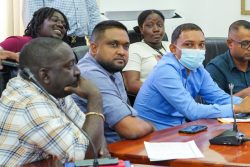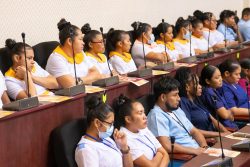With the country’s rum attaining international renown, raising the issue of alcohol abuse is sometimes seen as taboo, according to Pan-American Health Organization (PAHO) Representative to Guyana Dr William Adu-Krow, who says programmes are needed to promote responsible drinking as well as to steer people away from dependency.
“Alcohol is a major issue; I have raised it several times. Normally the response that I get is that, ‘Oh, we have our world renowned rum and therefore you cannot say too much about alcohol,’” Adu-Krow recently told Stabroek News.
“Irrespective of if we have the best rum in the world, I think we can do responsible drinking and I think that is an issue we want to bring to the table,” he added.
Adu-Krow while advocating for responsible drinking says that instead of just imposing punishment, effective programmes need to be created and implemented to steer people away from a life of alcohol.
With alcohol frequently linked to accidents and domestic disputes, both fatal and non-fatal, there have been public calls over the years for more social programmes to help alcoholics fight their addiction but nothing much is being done at the level of government as yet in this regard.

Adu-Krow admitted that PAHO has not done much work in the area of alcohol abuse but signalled that it would be moving in that direction.
“We have a lot more work to be done in terms of alcohol and I am hoping the coming years will see us doing just that,” he stressed, while noting that it will definitely be looking at the creation of programmes that would “bring people out of alcohol abuse.” He said that programmes have to be able to help people reduce the amount they drink or help them not to become alcoholics.
“It’s not all about punish people, punish people, punish people,” he said.
According to him, PAHO has made efforts to assist with programmes that would reduce road traffic accidents and he spoke of the linkage between the effects of drinking and driving and such accidents. There have been more fatal accidents resulting from drunk driving of recent and the police have expressed worry.
Adu-Krow made it clear that PAHO’s position is not that one should not drink alcohol or that it should be banned but that it should be consumed responsibly.
Asked what could be done to help people understand responsible use, he said that this is “fairly easy but not so easy.” He made mention of the selling of alcohol to minors. “In many countries, in many civilizations, you cannot sell alcohol to anybody,” he said, while noting that it has to be made harder for youths to have access to alcohol.
It should also be made harder for those of age to access alcohol after a certain hour, he said, while pointing out that the government’s implementation of the 2 am curfew is one such intervention.
He added that he believes testing someone suspected to be driving under the influence should go a step beyond the use of breathalysers to the testing of blood samples. “If you have higher levels in your blood …you have to go to court,” he said.
It was also pointed out that in other jurisdictions, there are places where bar owners can be prosecuted if they sell alcohol to someone who is already drunk.
Adu-Krow added that Guyana may also want to look at the approach of some countries that have taken a decision to ban the beverages that have a very high alcohol content.
Ultimately, Adu-Krow stressed that alcohol abuse is a developmental problem and all the sectors would have to come together in order for it to be effectively tackled. “It is going to lead to broken homes… shattered lives… destroyed lives,” he stressed.
Mandatory testing
Karen Roberts, PAHO’s specialist in Non-Communicable Diseases, agrees that the interventions will have to be comprehensive, particularly since there continues to be numerous incentives for persons to buy and drink more alcohol.
“Everybody has to be involved in the education and awareness… the increasing incidence of alcohol [abuse] is indeed a challenge and is something that we have got to look at,” she said.
She too spoke of road safety and pointed out that the use of the breathalyser testing is voluntary in suspected driving under the influence cases and as a result there have been discussions on the implementation of a mandatory blood alcohol test if an accident occurs.
“People can agree to do it [the breathalyzer test] or not to do it. One of the issues we are looking at in consultations with the Road Safety Council, Ministry of Public Infrastructure, Georgetown Public Hospital [GPH] and the Ministry of Public Security is the whole issue of blood alcohol testing for people once they have been involved in an accident,” she said.
According to Roberts, having such a test done has implications for modifications of some aspects of the Road Traffic Act.
At the same time, Roberts noted that PAHO is trying to help the GPH, where people mainly involved in accidents go, to strengthen its capacity to do blood-alcohol testing. She said that during the discussions with the Ministry of Public Security and their people, it was realised that “there are also legal implications for blood alcohol testing and we are likely to encompass some of the similar challenges that we have with the breathalyser.”
Roberts said that there would have to be some type of legislation put in place to make this test mandatory. “When you take into consideration the human rights aspect, you are going to wonder if at any point in time you can mandate that people must have a test,” she said, while informing that these are some of the areas that PAHO is trying to look at.
In the meantime, she said that the Ministry of Public Security is being encouraged to increase the monitoring on the roads, with the presence of more traffic police and implementation of some preventative measures. “For instance, when we have these big sporting activities where we know that there is likely to be a lot of consumption of alcohol, have escorts,” she said, while recalling that she recalled this happened years ago during one of the Kashif and Shanghai Football tournaments.
Roberts said too that the ministry is also being encouraged to start education campaigns. She explained that this could be in the form of stopping drivers and cautioning them while enforcing aspects of the law. She said that the implementation of “child restraints” ought to be looked at, as it is clear that in Guyana children don’t wear any seatbelts while in moving motor vehicles. “We believe that a combination of interventions are going to have to be implemented in order for you to have any kind of impact,” she said.
As far as encouraging responsible drinking is concerned, Roberts noted that the issue is thorny. “When you have community discussions about responsible drinking people have different interpretations,” she pointed out, while saying that this is one of the things that would have to be clearly defined.








